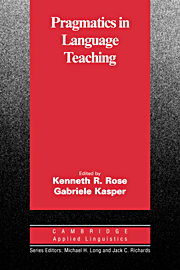Book contents
- Frontmatter
- Contents
- List of contributors
- Series editors' preface
- Preface
- Chapter 1 Pragmatics in language teaching
- I THEORETICAL AND EMPIRICAL BACKGROUND
- II ISSUES IN CLASSROOM-BASED LEARNING OF PRAGMATICS
- III THE EFFECTS OF INSTRUCTION IN PRAGMATICS
- IV THE ASSESSMENT OF PRAGMATIC ABILITY
- References
- Name index
- Subject index
III - THE EFFECTS OF INSTRUCTION IN PRAGMATICS
Published online by Cambridge University Press: 05 October 2012
- Frontmatter
- Contents
- List of contributors
- Series editors' preface
- Preface
- Chapter 1 Pragmatics in language teaching
- I THEORETICAL AND EMPIRICAL BACKGROUND
- II ISSUES IN CLASSROOM-BASED LEARNING OF PRAGMATICS
- III THE EFFECTS OF INSTRUCTION IN PRAGMATICS
- IV THE ASSESSMENT OF PRAGMATIC ABILITY
- References
- Name index
- Subject index
Summary
Compared to areas such as grammar, lexis, or phonology, the effects of instruction on interlanguage pragmatic development have been explored far less. As Kasper (this volume) points out, the research that has been done to date does indicate that pragmatic development, though observed to occur in second language classrooms without instruction, can be facilitated by instruction, particularly when that instruction is of an explicit nature. Part III consists of five chapters examining the effect of different instructional approaches on specific aspects of L2 pragmatics. In Chapter 7, Anthony Liddicoat and Chantal Crozet investigate the effects of instruction given to Australian university students of French as a foreign language on the acquisition of one target interactional practice, namely, responding to a question about the weekend. Previous research indicates that although the question “Did you have a good weekend?” is a phatic, ritualized greeting which requires little or no elaboration in the response for Australians, for French speakers the question is not phatic and often elicits a lengthy response replete with lively descriptions to which the listener is expected to carefully attend. The potential for misunderstanding, frustration, and negative stereotyping that these differences present has been well attested. In their study, Liddicoat and Crozet used role-plays in a pretest/posttest design with an intervening four-phase instructional treatment consisting of awareness raising, narrative reconstruction, production, and feedback. They found that after instruction, learners did more closely approximate French norms, in terms of both particular language features and content.
- Type
- Chapter
- Information
- Pragmatics in Language Teaching , pp. 121 - 124Publisher: Cambridge University PressPrint publication year: 2001



